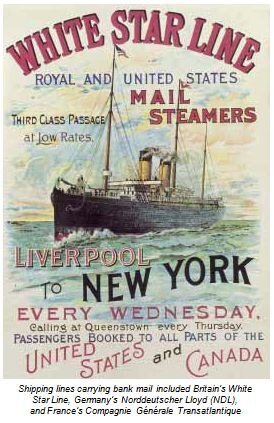Citi Turns 200: New forex department for clients with operations abroad
In celebration of Citigroup's 200th Anniversary, we are sharing stories from our rich history here on this blog. The sixth installation below covers how we expanded abroad by opening a foreign exchange department. Read the fifth installment on how Jacob Schiff helped us break into investment banking, here.
New forex department for clients with operations abroad
By the end of the 1800s, some of the large corporate clients of National City Bank conducted much of their business outside the United States. Among them were Standard Oil (particularly strong in China) and American Sugar Refining. In response to their needs, in 1897 the bank opened a foreign exchange department, offering to buy and sell drafts, make cable transfers and collections, and issue travelers' letters of credit.
This was a relatively new type of business in the United States. Against this background there was growing European investor interest in dollar-denominated stocks and bonds, especially in London but also in Berlin, Amsterdam, and Brussels. As to capital markets, National City Bank acknowledged that London was still the undisputed leader, notwithstanding the growing importance of the New York, Paris, and Berlin bourses.
One of the first big transactions of the new foreign exchange department came in 1899, when the bank received a $5-million deposit from the United States Treasury. This amount was to be credited to Spain as part of a $20-million payment for the Philippines under the treaty ending the Spanish-American War.
By 1912, National City Bank had correspondent banking relationships with 132 banks worldwide and had deposits with them amounting to $6 million.
The foreign exchange department drew many recruits from Europe. In 1907, there were individuals from Austria, Germany, the Netherlands, and Poland. Departmental manager John Gardin had noted that in Europe even messenger boys had to have completed high school or at least graduated from a commercial college before being employed by a bank. They had to be fluent in at least one foreign language and be prepared to work for no pay at all for the first three or four years.
"The men come out of their apprenticeship with a thorough business education, well fitted to the battle of life," he wrote. According to Gardin, Americans considering a career in foreign exchange needed a broad world view. They had to be "acquainted with ethnological conditions the world over," he said, with "a knowledge of political events, throughout the universe, besides a certain skill in mathematics, reaching far beyond the multiplication table."
